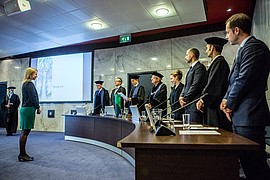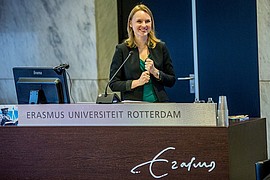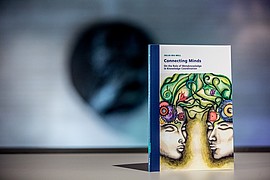PhD Defence: Connecting Minds: On the Role of Metaknowledge in Knowledge Coordination

In her dissertation ‘Connecting Minds: On the Role of Metaknowledge in Knowledge Coordination’, ERIM’s <link people julija-mell>Julija Mell aims to further our understanding of how groups and larger collectives process information and integrate their knowledge and what factors influence the social interactions at the core of this process. Knowledge coordination, that is, the process of locating, transferring, and integrating the specialized knowledge of multiple individuals, is a critical prerequisite for organizations to make fuller use of one of their most important resources: the knowledge of their employees. Yet, knowledge coordination is as challenging as it is important.
Julija Mell will defend her dissertation in the Senate Hall at Erasmus University Rotterdam on Thursday, 5 November 2015 at 11:30. Her supervisors are <link people daan-van-knippenberg>Prof.dr. D.L. van Knippenberg and <link people wendy-van-ginkel>Dr. W.P. van Ginkel. Other members of the Doctoral Committee are <link people steffen-giessner>Prof.dr. S. Giessner (RSM), <link people pursey-heugens>Prof.dr. P.P.M.A.R. Heugens (RSM), and Dr. M. Mortensen (INSEAD).
About Julija Nia Mell

Julija Nia Mell (1987) received her Diploma (Master’s) degree in Psychology from Humboldt University Berlin in 2010. She started her PhD at Rotterdam School of Management in January 2011 and was a visiting PhD at Northwestern University in 2013 and 2014. Currently, she is an Assistant Professor of Management at ESSEC Business School.
Julija’s research lies at the intersection between group cognition and social networks in organizations. Her dissertation examines the role of individuals’ metaknowledge, i.e. the knowledge of who knows what, in knowledge coordination processes in groups and across group boundaries. Her work has appeared in the Academy of Management Journal, Group Processes and Intergroup Relations, and Economica. Julija is a member of the Academy of Management, the Interdisciplinary Network for Group Research, and the International Network for Social Network Analysis.
Thesis Abstract

Knowledge coordination, that is, the process of locating, transferring, and integrating the specialized knowledge of multiple individuals, is a critical prerequisite for organizations to make fuller use of one of their most important resources: the knowledge of their employees. Yet, knowledge coordination is as challenging as it is important. This dissertation aims to further our understanding of how groups and larger collectives process information and integrate their knowledge and what factors influence the social interactions at the core of this process.
The three empirical studies contained in this dissertation examine the role of individuals’ metaknowledge - the knowledge of who knows what - in knowledge coordination processes. Findings from the first two studies indicate that individuals who have an above-average level of metaknowledge can play a critical role in catalyzing information processing and decision making in teams as well as in helping to integrate knowledge between organizational groups. The third study furthermore elucidates the role of formal rank in shaping informal organizational networks through which employees seek knowledge as well as metaknowledge.
The findings presented in this dissertation contribute to research on group cognition, knowledge integration within and between groups, and intra-organizational networks. Most importantly, together these studies underscore the importance of taking into account differences in individuals’ metaknowledge in creating a better understanding of knowledge coordination in organizations.
· View and download Julija's dissertation
Photos: Chris Gorzeman / Capital Images


